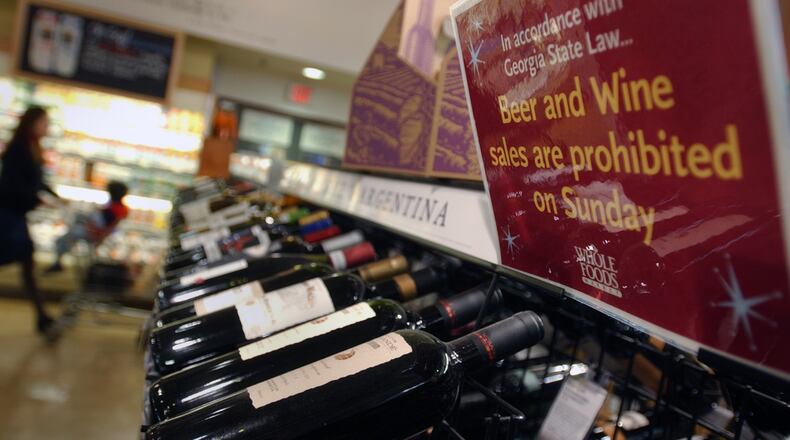With the COVID-19 pandemic changing the way many Georgians shop, Gov. Brian Kemp on Monday signed legislation allowing stores and at least some restaurants to deliver beer, wine and booze to homes.
Only a decade ago Georgia didn’t allow stores to even sell alcoholic beverages on Sundays, but the political climate has changed greatly since then. The coronavirus pandemic, which persuaded more Georgians to have groceries and other goods delivered to their homes, helped spur that change and made House Bill 879 easier to pass
“House Bill 879 is a great example of how Georgia’s regulatory system allows for increased consumer choice while providing local businesses with the opportunity to grow and flourish,” said K.C. Honeyman, the executive director of the Wine and Spirits Wholesalers of Georgia.
The Department of Revenue will have to draw up regulations for home delivery before stores can use the new law, and House Ways and Means Chairman Brett Harrell, R-Snellville, the measure’s sponsor, said it could take a few months before businesses can start deliveries.
During debate on the measure. Harrell called it part of the changing way Georgians shop.
“It’s just a response to consumer demand,” Harrell said. “One of the companies that delivers in other states had over 400,000 requests for delivery (in Georgia) in calendar year 2019 ... and they had to say ‘no’ to every one of them.
“Clearly, there is demand, and more and more people are ordering groceries online. It’s just a convenience for the consumer.”
More and more Georgians have their purchases delivered to their homes, and the coronavirus pandemic expanded the market as many have sought to avoid grocery stores, restaurants and other businesses in hopes of steering clear of COVID-19.
Some restaurants in metro Atlanta have already been delivering alcoholic beverages with food orders during the pandemic.
Harrell’s legislation, House Bill 879, passed his chamber before the General Assembly suspended the 2020 session in March because of the pandemic. When lawmakers returned in June, he made passing the measure a priority.
Under the delivery law, beer or wine can’t just be left on the front porch like Amazon deliveries. The delivery person would have to check IDs to make sure the buyer is old enough to purchase alcohol.
The law allows local municipalities to opt out of allowing alcoholic beverage delivery.
Whether restaurants could deliver would depend on local laws that govern their business.
The association for small liquor stores in Georgia — long a powerful lobby at the Capitol — opposed the legislation, saying its 500 outlets would be at a disadvantage because they are not set up with websites and a delivery system. The Baptist lobby — which traditionally opposes expansion of alcohol availability — also spoke out against it.
But the law proved another major shift in the way the General Assembly has viewed the sale of alcoholic beverages.
“Twenty-five years ago just any bill was called a liquor bill and you’d have trouble passing it,” Senate Minority Leader Steve Henson, D-Stone Mountain, said in June. “We’ve changed a lot over the years.”
For decades, Georgia had restrictive alcohol sales laws, and it took about five sessions for the grocery and convenience store lobbies to persuade the General Assembly to allow Sunday retail sales of beer, wine and liquor. The measure only passed in 2011 after Gov. Sonny Perdue, a religious conservative who opposed it, left office.
At the time, Georgia was one of only three states with a complete ban on Sunday alcohol sales at stores.
Grocery store chains such as Kroger and Publix, brewpubs and other businesses have lobbied hard to expand the availability of products they sell or produce over the past decade.
Martin Smith, a lobbyist for the Georgia Beer Wholesalers Association, said the latest bill sets “a high standard for the safe delivery of alcohol in our state.”
“Soon, local restaurants, grocery and package stores will be able to vastly expand their operations by delivering products provided by our state’s wholesalers to homes across Georgia,” he said.
About the Author
Keep Reading
The Latest
Featured





